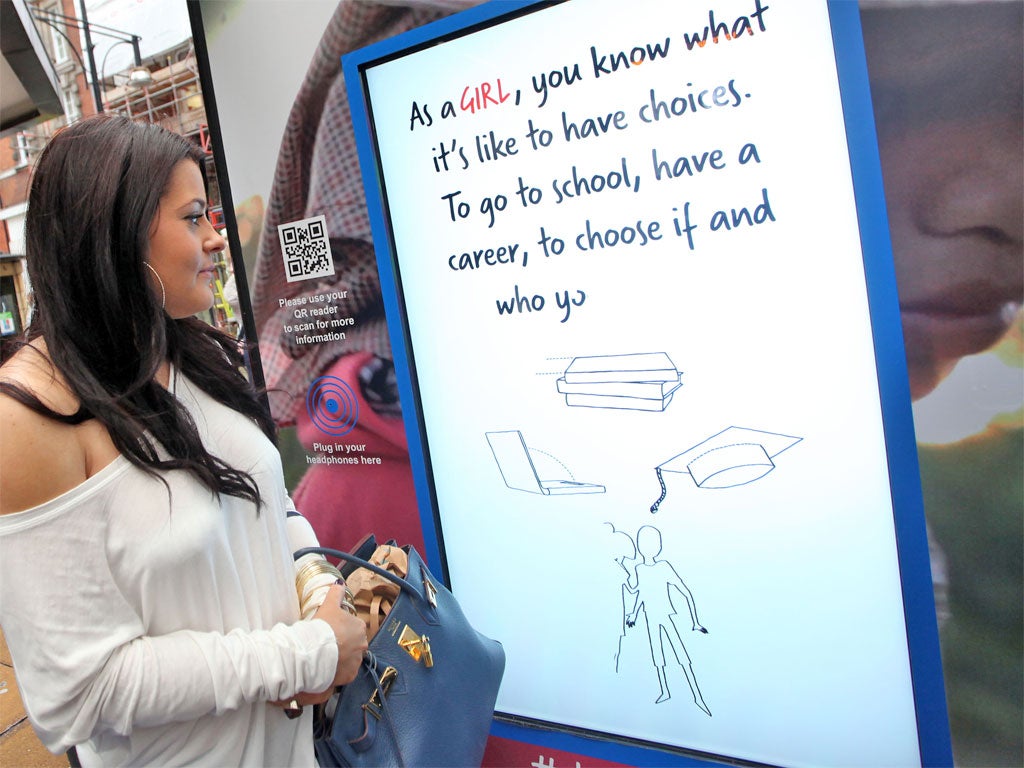The ad that only plays to women: the future of marketing or useless gimmick?
Charity launches face recognition billboard on Oxford Street to highlight gender discrimination

A bus stop on London's Oxford Street became an unlikely tourist attraction yesterday after being chosen as the spot for a new form of interactive advertising smart enough to distinguish men from women.
The technology, the first of its kind, works by scanning faces before measuring the distance between the viewer's eyes, width of the nose, length of jaw line and shape of cheekbone to compare the data and estimate their gender. It is the latest development in a move towards adverts that use technology to break free from the constrictions of billboards.
The system claims to be 90 per cent accurate, which our two testers (one woman, one man) will be pleased to hear, after they both had their sex wrongly assessed on first try. Advertising agencies will be watching the public response closely, but this particular campaign is for charity Plan UK.
Their campaign aims to highlight the plight of the world's poorest girls by showing a 40 second video of the everyday lives of three 13-year-olds from the UK, Mali and Thailand, who reveal their hopes and dreams for the future. However, having determined the sex of the viewer, the video is only played to passing women rather than men – the idea being that it will raise awareness of gender discrimination in the process.
"Millions of girls across the globe are being denied the right and choice to have an education," said the charity's Marie Staunton. "This ad is a deliberate attempt to raise public debate on this issue."
Pedestrians can also plug their headphones into the bus stop to get the full effect. "It is a really great idea," said Joanna Kent, 24, a receptionist from London. "I hate waiting for the bus so it would kill a bit of time, although I would be more likely try it out if I was with a friend. I'd feel a bit silly doing it on my own."
She also appreciated the fact that the ad was for a good cause and not for, say, make-up. "Anything to do with helping young girls really interests me and it's fantastic that it's drawing attention to underprivileged children – but I can't say I learnt a huge amount that I didn't know already.
"The information it gives is fairly basic, but I'd probably learn more online."
Sales director Mark Wainwright, 30, agreed that the format was intriguing but failed to see the point in having such hi-tech advertising if he couldn't take part in it.
"I understand that they're trying to make a point, but all they've done is alienate me. I was interested in the charity's work but I'm still none the wiser. They give you the website details but it's not likely I'm going to go away and look it up," he said.
Earlier this month, McCain launched "smell-vertising" for a new line of frozen jacket potatoes, which saw bus stops fitted with capable of releasing the aroma of fresh oven-baked potatoes at the touch of a button.
At the moment the public has to opt in to take part in such forms of marketing, but it is likely to be only a matter of time until interactive advertising is forced upon us – as witnessed in the Tom Cruise film Minority Report.
Join our commenting forum
Join thought-provoking conversations, follow other Independent readers and see their replies
Comments